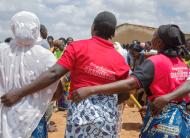Living in poverty is generally defined as making less than $1.25 a day. According to a 2013 report by the World Bank 10.7 percent of the world’s population falls under this category. That is more than 700 million people. But there is so much more to poverty than $1.25.
Poverty prevents millions of people from reaching their full potential. People like Ike Rebecca, one of our program participants in Nigeria. Her father died when she was in primary school, forcing her to drop out so she could help out at home. She was then married within a year of hitting puberty. At the age of 32 she has already lost three of her four children and her husband. After her husband died, while she was pregnant with her daughter, she was put under the care of her in-laws, as is customary in her culture, however, she was mistreated and denied any right to her husband’s land. Having nothing other than her daughter, she was forced to move back home into her father’s house.
Even in 2017, women are more likely to suffer from poverty than men. Only 39.4 percent of the formal labor force is female. Women living in poverty are more vulnerable to slavery, violence, and discrimination. Unlike what one may have learned in history classes, slavery is still very much part of the reality of the world. Modern day slavery is generally broken into four categories: forced labor, forced marriage, forced sexual exploitation, and state-forced labor. There are 40.3 million people living in slavery today. Seventy-one percent of them are women. People who are forced into or born into modern-day slavery have very few if any chances to become economically empowered and escape.
Even if they don’t face the threat of slavery, impoverished women are disenfranchised and marginalized. For example, women in Africa contribute 70 percent to food production and contribute half of all farm labor. Yet, in many cases, these women do not reap the rewards because they do not have the same rights to land ownership that men do, as we saw in Ike Rebecca’s story. In fact, 25 million urban women in the Middle East and North Africa lack equal constitutional and statutory property rights. Lack of land rights often prevents women from having the financial security to start businesses or get the respect and decision-making rights they deserve in their communities.
In countries impacted by conflict and war that Women for Women International works in, there is a direct correlation between conflict and women’s poverty. A striking example of this is the Democratic Republic of Congo (DRC). According to a report done by Promundo Global, approximately 70 percent of men and 80 percent of women claim that they were directly affected by war and conflict in the DRC. During the Second Congo War over five million people were killed, and although the war officially ended in 2003, conflict continue and the country is barely recovering, economically and socially. In fact, in 2016, the average income of a family living in the DRC was only $800 a year making it the second poorest country in the world, just behind the Central African Republic.
The reality is that in DRC and other countries impacted by poverty and conflict, the solution to ending poverty lies in empowering women. A report by McKinsey Global Institute estimates an additional $28 trillion dollars could be added to the global annual GDP if women played an equal role in the economy. That's an 11% increase.
If women like Rebecca have the chance to earn an income, the impact goes beyond lifting themselves out of poverty. Once enrolled at Women for Women International’s program, Rebecca learned about her rights and learned to advocate for herself and obtain a piece of her husband’s land. She also learned business and numeracy skills. With the money we gave her every month through our sponsorship program, she was able to buy seeds, and has grown okra that she sells in the local market. With her newfound knowledge, she recognizes the importance of education and is sending her daughter to school in the hopes that she will have a better life.
Empowering women to earn an income is the right thing to do. The right to work with dignity is a human right, and investing in women’s economic empowerment is also smart economics. If we have any chance in eradicating poverty, it is in making sure women are fully participating in their country’s economy. This is why Women for Women International works to economically and socially empower women. Our impact is astounding. Not only does the daily income of our graduates increases from $0.34 at enrollment to $1.07 after graduation, but many also join savings groups to save money and invest in their businesses so they can end poverty in their families and communities.
Anyone can take a step towards eradicating poverty by sponsoring a woman through Women for Women International. With a monthly sponsorship, you can help a woman go through our training program, stand on her own feet and rebuild her own and her family’s life. If you are interested in supporting women impacted by war, including women living in rural areas in Afghanistan, the Democratic Republic of Congo, Nigeria, Rwanda and South Sudan, you can sponsor a sister for $35 a month or visit http://www.womenforwomen.org/ways-give to learn more.

